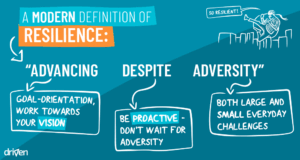Entrepreneurship is often painted as a journey of relentless innovation and glamorous success. However, the lived experience tells a different story – one marked by uncertainty, setbacks, and the constant pressure to adapt.
The U.S. Bureau of Labor Statistics reports that 20% of small businesses fail within the first year, and nearly half do not survive past five years.
Despite these daunting figures, certain entrepreneurs rise above adversity and build lasting, impactful enterprises. Their defining trait? Resilience.
This article explores the role of resilience in entrepreneurship, the key challenges business leaders face, and proven strategies to overcome them with confidence and clarity.
Resilience: The Pillar of Entrepreneurial Endurance
Resilience is not just about bouncing back – it’s about recalibrating, learning, and progressing with greater insight. It is the ability to adapt in the face of volatility and remain focused on long-term vision amidst immediate disruption.
The American Psychological Association recognizes resilience as essential to sustained success. Consider Mo Abudu, founder of EbonyLife Media, who challenged a male-dominated industry with little initial capital and limited support.
Through unyielding determination, she transformed her vision into a media powerhouse, elevating African narratives to global prominence. Her story demonstrates that resilience is often the catalyst for revolutionary success.
As Angela Duckworth affirms in Grit, the combination of passion and persistence is a stronger predictor of success than talent alone. Without resilience, even the boldest ideas can crumble under the weight of inevitable business challenges.
The Setbacks Entrepreneurs Must Learn to Master
Every entrepreneurial journey includes hurdles – but each challenge contains the potential for reinvention and growth.
- Financial Strain
Cash flow issues, inadequate funding, and rising operational costs are among the most common business killers. CB Insights notes that 38% of startups fail due to lack of funding. However, these financial hurdles can also drive entrepreneurs to cultivate smarter budgeting habits, diversify revenue streams, and adopt a more strategic mindset.
- Operational Inefficiencies
From logistical breakdowns to ineffective scaling processes, operational roadblocks test a business’s structural foundation. These stress points, however, present a chance to innovate internal systems and fortify processes for long-term stability.
- Personal Challenges
Entrepreneurship demands emotional strength. Burnout, imposter syndrome, and decision fatigue are real – and pervasive. Yet, these moments also offer powerful opportunities for introspection, boundary-setting, and learning the importance of building support systems.
Setbacks may arise from market disruptions or flawed strategies, but they are not fatal. Entrepreneurs who choose to reflect, recalibrate, and refocus ultimately gain the clarity and conviction necessary to rebuild stronger.

Transforming Fear of Failure into Fuel
Fear of failure is one of the most paralysing emotions entrepreneurs faces. But failure, when reframed, becomes a rigorous teacher – not a threat.
A study in the Journal of Business Venturing reveals that entrepreneurs who view failure as a growth opportunity are more likely to innovate, pivot, and lead with renewed confidence.
Practical Tools to Overcome Fear:
- Visualize the Win: Shift your attention from the fear of falling to the clarity of your vision. Picture your desired outcome and map the steps required to get there.
- Celebrate Milestones: Acknowledge every step forward. Small wins compound into lasting confidence.
- Reframe Setbacks: Detach your identity from the outcome. Failure is not personal – it’s feedback.
Anita Erskine, renowned Ghanaian media entrepreneur, faced multiple career rejections. Instead of retreating, she reframed those moments into building blocks for her empire. Today, her story stands as a blueprint for turning “no” into notable impact.
Four (4) Proven Strategies for Building Entrepreneurial Resilience
Resilience is a skill – one that can be nurtured and reinforced with intentional habits and strategies.
- Cultivate a Growth Mindset
Entrepreneurs with a growth mindset embrace challenges and view failure as a path to improvement.
Why it matters:
Carol Dweck’s research shows that those who believe they can grow through effort are more likely to persist and succeed.
How to implement:
- Reflect after every setback: “What did I learn?”
- Feed your curiosity: Read, watch, and listen to content that sharpens your skills.
- Recognize progress – even when the finish line feels distant.
Fred Swaniker of the African Leadership Group refined his strategy through continuous feedback and persistence, ultimately building a continent-wide institution that empowers thousands.
- Build a Strong Support Network
Entrepreneurship is not a solo pursuit. Surrounding yourself with advisors, peers, and mentors can multiply your growth and minimize blind spots.
Why it matters:
The Kauffman Foundation emphasizes that entrepreneurs with strong networks are better positioned to grow sustainably.
How to implement:
- Seek mentors: Learn from those ahead of you.
- Engage in communities: Incubators, forums, and masterminds foster collaborative problem-solving.
- Share experiences: Peer support reduces isolation and increases perspective.
Africa’s business magnate Aliko Dangote attributes much of his scaling success to his peer relationships and advisor network.

- Strengthen Emotional Resilience
Entrepreneurs must lead under pressure. Emotional intelligence enables composure, clarity, and constructive leadership.
Why it matters:
Daniel Goleman affirms that emotionally intelligent leaders make better decisions, inspire teams, and manage conflict more effectively.
How to implement:
- Practice mindfulness: Meditation or breathing exercises improve focus and reduce stress.
- Keep a reflection journal: Writing promotes clarity and resilience.
- Prioritize balance: Guard your energy – burnout is not a badge of honour.
Kenya’s Njeri Rionge, founder of Wananchi Online, credits her ability to remain composed under pressure as key to her sustained success across industries.
- Master Adaptability
Resilient entrepreneurs pivot without losing sight of purpose. In a world defined by rapid change, adaptability is non-negotiable.
Why it matters:
A Harvard Business Review study found that agile companies are far more likely to thrive in volatile markets.
How to implement:
- Track trends: Stay informed to anticipate disruption.
- Test and iterate: Use feedback loops to evolve your product or service.
- Know when to pivot: Recognize when your current model no longer aligns with the market.
Ivy Barley, co-founder of Developers in Vogue, successfully adapted her business to focus on African women in tech – a pivot that led to global recognition and partnerships.
Entrepreneurship is a journey of calculated risks, meaningful growth, and constant reinvention. While setbacks are inevitable, they are not defining – your response is.
Resilience isn’t a personality trait – it’s a leadership strategy. By embracing a growth mindset, cultivating a powerful support network, mastering emotional composure, and remaining adaptable, you can transform any challenge into your next breakthrough.
Are you ready for TRANSFORMATION? Dzigbordi Kwaku-Dosoo is a Ghanaian multi-disciplinary Business Leader, Entrepreneur, Consultant, Certified High-Performance Coach (CHPC™) and global Speaker.
She is the Founder and CEO of The DCG Consulting Group
She is the trusted coach to top executives, managers, teams, and entrepreneurs helping them reach their highest level of performance through the integration of technical skills with human (soft)skills for personal development and professional growth, a recipe for
success she has perfected over the years. Her coaching, seminars and training has helped many organizations and individuals to transform their image and impact, elevate their engagement and establish networks leading to improved and inspired teams, growth and productivity.










